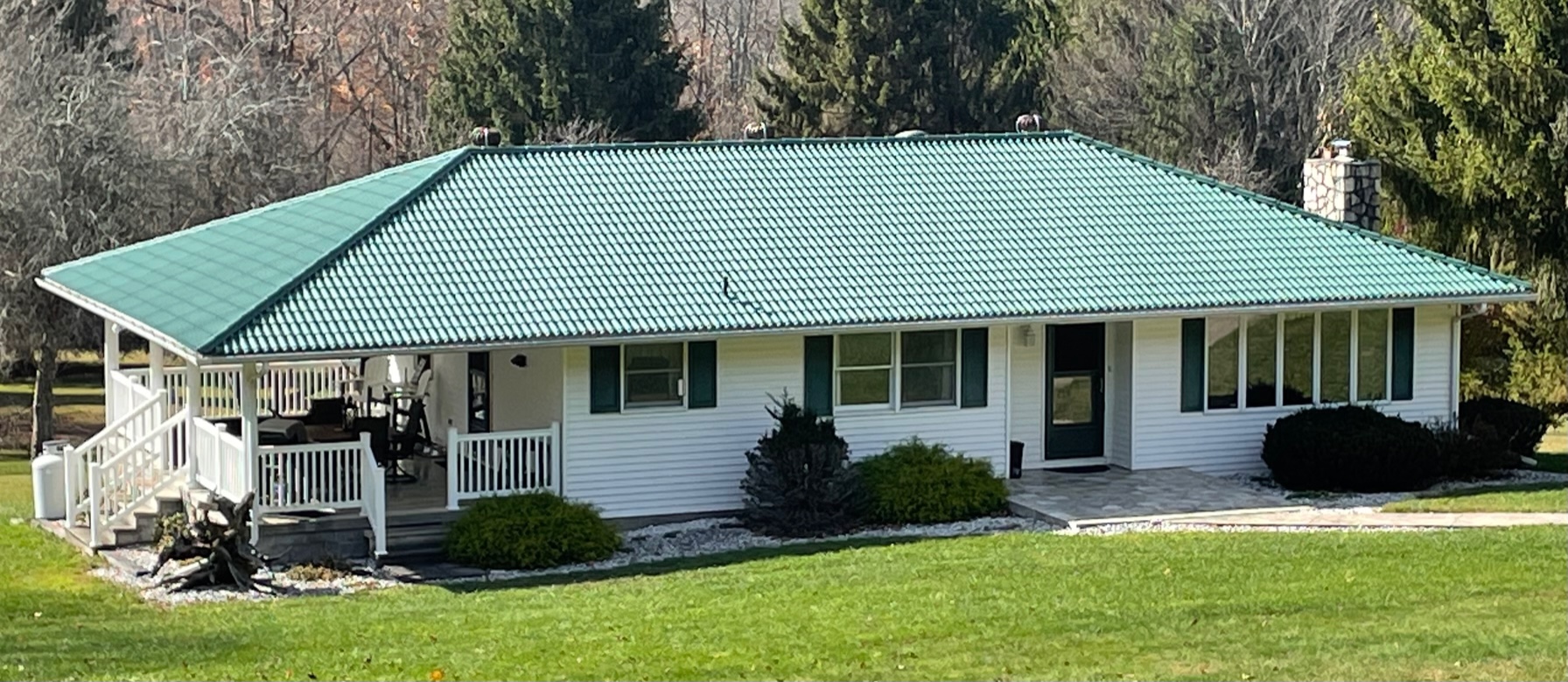Hip Roof
A Hip Roof is similar to a basic gable roof, except it has sloped sides (hips) creating triangular ends to the roof and trapezoids faces on the front and back. A basic hip roof has four faces which are all exposed to rain and snow from above and require roofing material.
A Full Hip Roof is defined by the span, length, pitch and overhang, where the angles of the hips are also the same as the pitch.
A Pyramid Hip Roof has four matching sides that come together at a point in roughly the shape of a pyramid. In this case, there is no ridge line.
Hip Roof Calculator
The Hip Roof calculators compute the area, ridge lengths and materials required for a basic hip roof.
- Surface Area of Hip Roof: This computes the surface area of the four faces of a hip roof based on the dimensions. The calculator also includes the number of 4x8s, bundles of shingles, bundles of ridge shingles and the number of roofing nails needed.
- Sheathing for Hip Roof: This computes the number of 4x8s need to cover the surface area of a hip roof based on the dimensions.
- Shingles for Hip Roof: This computes the number of standard and ridge shingles and roofing nails for a hip roof based on the dimensions.
- Cost of Shingles for Hip Roof: This computes the number of standard shingles for a hip roof based on the dimensions of the roof and size of the shingles and the unit price of a bundle of shingles to estimate cost of shingles for a hip roof.
- Roofing Nails for Hip Roof: This computes the number of roofing nails to shingle a hip roof based on the dimensions under normal and high wind conditions.
- Metal for Hip Roof: This computes the metal roof materials, panels and trim, for a hip roof based on the dimensions of the roof and width of the panels. Trim includes ridge cap, angle trim, and snow guard. It also includes the number of metal panel screws needed.
- Screws for Metal Hip Roof: This computes the number of metal panel screws needed for a hip roof based on the dimensions.
- Purlins for Hip Roof: This computes the total number and length of purlins (roof support boards) for a hip roof based on the ridge length of the roof, the roof pitch and the span of the roof.
- Underlayment for Hip Roof: This computes the surface area of a hip roof based on the dimensions and then uses the surface area to compute the cost of underlayment based on the unit price (price per square feet) of underlayment material.
- Surface area for Double Hip Roof: This computes the surface area of a hip roof with a hip roof dormer based on the dimensions and provides the number of 4x8 sheets, bundles of shingles, bundles of ridge shingles, length of flashing, and number of roofing nails for normal and high wind conditions.
- Hip Roof Geometries: This computes the metrics associated with of trapezoid pyramid shape of a hip roof based on the dimensions
A hip roof is a type of roof design where all sides slope downwards to the walls, usually with a fairly gentle slope. Each side of the roof typically has two slopes that meet at the top to form a ridge. The outer edges of the roof are angled upwards, creating a pyramid-like shape or trapezoidal shape.
Hip roofs are known for their stability and resistance to strong winds, making them popular in areas prone to hurricanes or high winds. They also provide good drainage, as rainwater easily runs off all sides of the roof.
Hip roofs are commonly found on a variety of structures including residential homes, barns, and some commercial buildings. They can be more complex to construct than simpler roof designs like gable roofs, but they offer advantages in terms of durability and aesthetics.
Parent Categories
Hip Roof Calculators and Collections
Hip Roof Equations
- Cost of Shingles for Hip Roof KurtHeckman Use Equation
- Double Hip Roof Area KurtHeckman Use Equation
- Double Hip Roof Geometries KurtHeckman Use Equation
- Hip Roof Geometries KurtHeckman Use Equation
- Interface Angle from Rise over Run KurtHeckman Use Equation
- Metal for Hip Roof KurtHeckman Use Equation
- Purlins for Hip Roof KurtHeckman Use Equation
- Pyramid Roof Geometries KurtHeckman Use Equation
- Roofing Nails for a Double Hip Roof KurtHeckman Use Equation
- Roofing Nails for a Hip Roof KurtHeckman Use Equation
- Screws for Metal Hip Roof KurtHeckman Use Equation
- Sheathing for Hip Roof KurtHeckman Use Equation
- Shingles for a Pyramid Hip Roof KurtHeckman Use Equation
- Shingles for Hip Roof KurtHeckman Use Equation
- Surface Area of Hip Roof KurtHeckman Use Equation
- Underlayment for Hip Roof KurtHeckman Use Equation
- Attachments
No attachments |

